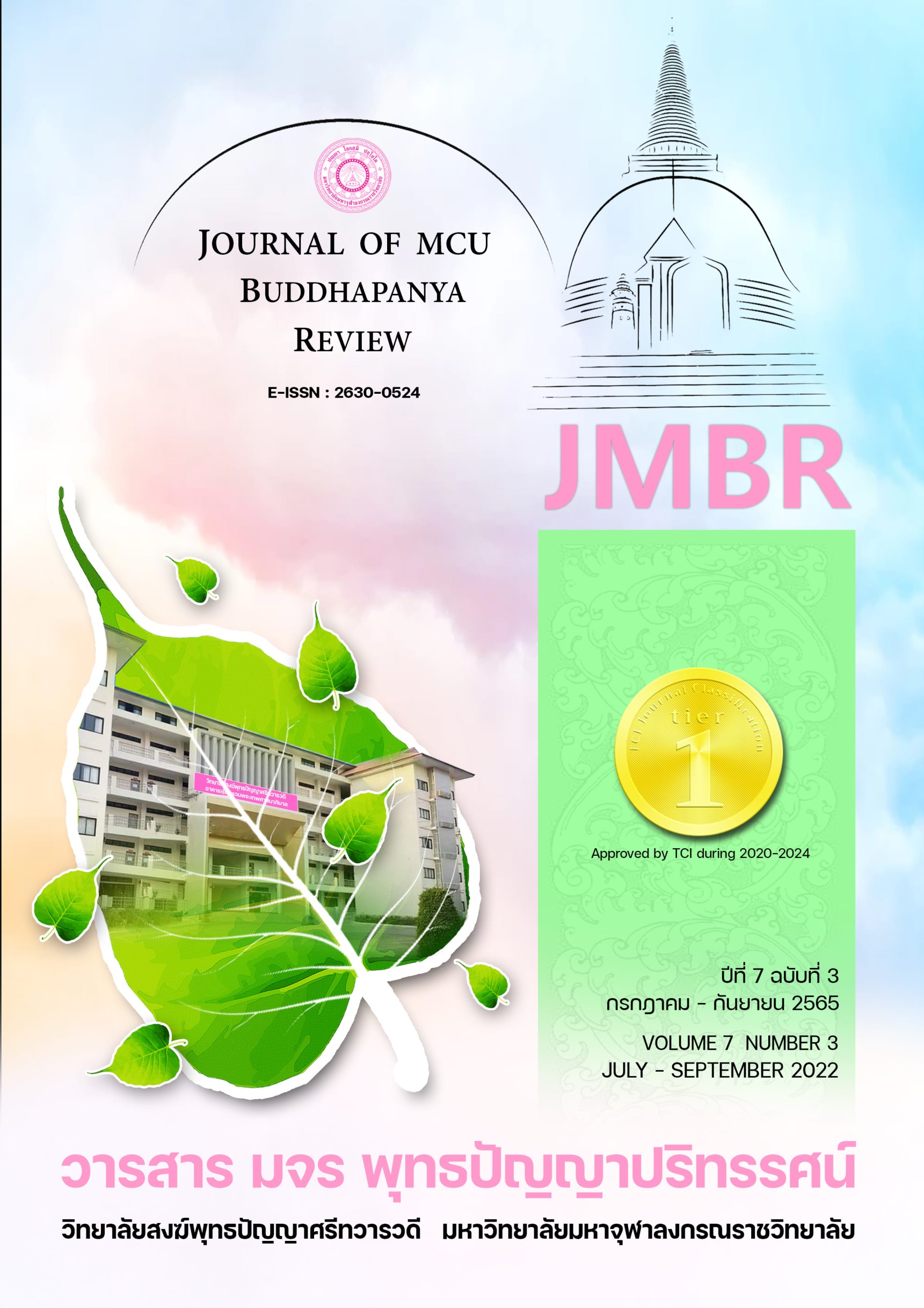พุทธบูรณาการกับศาสตร์พระราชาในการแก้ปัญหาทุจริตคอร์รัปชันประเทศไทย
คำสำคัญ:
พุทธบูรณาการ, ศาสตร์พระราชา, ปัญหาทุจริตคอร์รัปชันบทคัดย่อ
การทุจริตคอร์รัปชัน เป็นปัญหาเรื้อรังมาตั้งแต่สมัยประวัติศาสตร์ที่โจษจันกันมากในปัจจุบัน และได้แผ่ขยายฝังรากลึกไปสู่ทุกภูมิภาคของสังคม ส่งผลให้เกิดวงจรอุบาท “โง่ จน เจ็บ” ซ้ำซากไม่จบไม่สิ้น ภาพรวมระดับชาติ คือ เป็นอุปสรรคต่อการลงทุนในประเทศที่มีผลมาจากการทุจริตคอร์รัปชัน โดยการจัดอันดับขององค์กรเพื่อความโปร่งใสนานาชาติ ทั้งนี้ เพื่อเสริมรากฐานให้เกิดอนาคตภาพร่วมกันในการแก้ปัญหาทุจริต
คอร์รัปชัน โดยใช้หลักสัมมัปปธาน 4 เรียกว่า “4 เสาหลักแก้ปัญหาทุจริตคอร์รัปชันของประเทศไทย” บูรณาการกับศาสตร์พระราชา ได้แก่ 1) สังวรปธาน บูรณาการกับหลักมีวินัย 2) ปหานปธาน บูรณาการกับหลักสุจริต 3) ภาวนาปธาน บูรณาการกับหลักพอเพียง และ 4) อนุรักขนาปธาน บูรณาการกับหลักจิตอาสา และกตัญญู ขับเคลื่อนผ่านกระบวนการ A-I-C ภายใต้การมีส่วนร่วมของทุกภาคส่วนในสังคม “รัฐ บ ว ร” ได้แก่ รัฐบาล สถาบันครอบครัว องค์กรศาสนา สถานศึกษา และเครือข่ายภาคประชาชน เพื่อขับเคลื่อนประเทศไทยไปสู่ความมั่นคงในปัจจุบันและอนาคต
เอกสารอ้างอิง
Anti-Corruption Action Center, Ministry of Public Health. (2021). Guidelines for preparation of anti-corruption action plans Misconduct for the fiscal year B.E. 2565 Agencies under the Office of the Permanent Secretary, Ministry of Public Health. Bangkok: Anti-Corruption Action Center Ministry of Health.
BBC Thai. (2019). Corruption: Thailand Transparency Ranking 2018 dropped from 96 to 99. Retrieved October 3, 2021, from https://www.bbc.com/thai/thailand-47028658
________. (2020). Corruption: Thailand Transparency Rankings 2019 dropped both globally and ASEAN. Retrieved October 3, 2021, from https://www.bbc.com/thai/thailand-51217494
Board of Directors of Textbooks, Mahamakut Raja College. (1997). Magalatthadipani Translation Volume 1. (13th ed). Bangkok: Mahamakut Wittayalai Printing House.
Chanrong, W., Phramaha Sangkom Chagnlek, Vichaisoong, C., & Phunprasit, O. (2021). Solving Corruption Problems in the Digital Age According to Buddhist Ethics, Journal of Modern Learning Development, 6(4), 398-408.
Chareonwongsak, K. (2003). Integrative thinking. (3rd ed.). Bangkok: Success Media Co., Ltd.
Department of Religious Affairs, Ministry of Culture. (2016). Summary of the national moral promotion master plan No. 1 (B.E. 2559 – 2564). Bangkok: Department of Religious Affairs, Ministry of Culture.
Homsombat, H., Phrapalad Phakharat Siltecho & Poonasron, S. (2021). Garāvāsa Dhamma: Sustainable Corruption Prevention. Dhammathas Academic Journal, 21(2), 160-169.
King's Education Center for Local Development Chiang Mai Rajabhat University. (2020). King's science Academic documents inherit of the King's science. Chiang Mai: Wanida Printing.
Mahachulalongkornrajavidyalaya University. (1996). Thai Tripitakas. Bangkok: MCU Press.
Mookpradit, M. (2006). An Analytical Study of H.M. the King’s Sufficiency EconomyPhilosophy and Buddhism. Bangkok: Mahachulalongkornrajavidyalaya University Press.
Myrdal, G. (1968). The Folklore of Corruption. The Asian Magazine, 8(24).
National Moral Promotion Board. (2018). Moral promotion “Sufficiency Discipline Honesty Volunteer” create good people for society. Bangkok: Pimdee Co., Ltd.
Office of Public Sector Anti-Corruption Commission. (2015). Manual course and guidelines for building a public sector network against corruption. Bangkok: Office of Public Sector Anti-Corruption Commission Ministry of Justice.
Office of Public Sector Anti-Corruption Commission. (2018). Anti-Corruption Studies Course (Anti-Corruption Education). Nonthaburi: Office of Public Sector Anti-Corruption Commission.
Office of the National Economics and Social Development Council. (2012). from the philosophy of sufficiency economy to action than 1 decade. Bangkok: Daoreuk Communications Co., Ltd.
Panjawattanakun, J. (2019). Virtue and Corruption Problems in Thai Society. Journal of Buddhamagga, 4(2), 2-9.
Phongpaichit, P., Piriyarangsan, S. (2006). Corruption Theory. Bangkok: Ruam duay Chuay kan.
Phra Brahmamangkalajarn (Luang Por Panyananthaphikkhu). (2007). Teachings of Luang Pho, Dharma inheritance 5 good: to become a complete human being. Bangkok: Banlue Tham Institute.
Phra Paisal Visalo. (2001). Thai way of society civil society and community culture. Bangkok: Srinakharinwirot University.
Phra Phalakorn Sumangalo (Anupan). (2016). The Relationship Between Law and Morality, Ethics, Religion and Tradition. Dhammathas Academic Journal, 16 (3), 278-289.
Phramaha Amka Worapanyo (Sukdaeng), Yupas, Y. (2021). Application Dhamma and Politics for people’s Pappiness on the way of Righteousness. Journal of Buddhist Studies, 12 (1), 218-235.
Phramaha Amka Worapanyo, Kenaphoom, S., & Yupas, Y. (2020). APPLYING POLITICAL UTILITY FOR PEOPLES’ HAPPINESSUNDER THE ETHICS BASIS. Journal of MCU Social Science Review, 9(3), 275-288.
Phuangngam, K. (2007). Corruption in Local Administrative Organizations: Measures and Preventive Mechanisms. King Prajadhipok's Institute journal,107-130.
Rathprasert, K., Nakata, T. & Kerdwichai, R. (2014). Corruption in the Thai Bureaucracy: Synthesis of knowledge approach to the solutions from Leaders and very important persons of Thailand. HCU Journal, 18(35), 61-74.
Roopkhamdee, W. (2009). Assessment of local government organizations for excellence in transparency and promoting people's participation year 2009. Nonthaburi: National Institute of Development Administration.
Royal Academy. (1999). Royal Institute dictionary. Bangkok: Nanmeebooks Publication.
Sangha Supreme Council. (2021). Principles of teachings in Buddhism with anti-corruption courses (Anti-Corruption Education). Bangkok: Sangha Supreme Council.
Secretariat of the House of Representatives. (2017). Constitution of the Kingdom of Thailand B.E. 2560 (Royal Gazette. Issue 134, Chapter 40 a) Bangkok: Secretariat of the House of Representatives.
Soisud, V., Chanidthai K., & Khethan, P. (2020). Community and local self-management in a changing situation at present. Journal of MCU Buddhapanya Review, 5(3), 216-227.
Somdet Phra Buddhakosajarn (P. A. Payutto). (2017). vinaya: bigger than expected (Bilingual edition). Bangkok: Pridham Publisher.
Somdet Phra Sangkharat Meditation center. (2018). Somdet Phra Ariyawongsakhatayan Sakolmahasangkhaparinayok Give sommodana on the opening of the week Visakha Bucha - Atamee Bucha day June 1, 2018. Retrieved 1, October, 2021, from givesommodanahttps://m.facebook.com/ambara.meditationcentre/photos/a.108577104711699/197466169156125/?type=3&source=48&__tn__=EHH-R
Srijarumethayan, J. (2018). Anti-corruption and Anti-bribery Policy. Journal of Research and Development Institute, Rajabhat Maha Sarakham University, 5(2), 301-309.
Sudachan, S. (2016). Criticize “Magalatthadipani book”. Mahachula Academic journal, 3(2), 179-184.
Sukhumalpong, J. (2013). The Trend of Corruption in Thailand. Bangkok: Parliament.
Tantivejkul, S. (2021). King's science. Retrieved October 8, 2021, from https://sites.google.com/site/sastrphraracha2020/khwam-pen-ma
Teerakul, S. (2017). Collect royal speech of his majesty the king. Retrieved October 1, 2021, from http://www.stabundamrong.go.th/web/book/53/b4_53.pdf
Tenissara, S., Ruangsa, N. (2021). SUFFICIENCY MIND FOR ANTI-CORRUPTION. Journal of Buddhist Education and Research: JBER, 7(1). 248-259.
Thailand institute of Justice. (2020). “Good life requires virtue” Retrieved October 2, 2021, from https://www.tijthailand.org/public/files/movement/OSP_ITA/PPT-ท่านทูต-Edit%20เวลา%2016.10.pdf
Thairath online. (2021). Thailand's corruption rankings aggravate the economy. Retrieved September 28, 2021, from https://www.thairath.co.th/news/politic/2023849
Uwanno, B. (1995). Fraud detection system for high-ranking office holders research report Democracy development committee. Bangkok: The Thailand Research Fund (TRF).
Watchdog. (2021). The process of combating corruption of the peoples. Retrieved September 29, 2021, from https://www.facebook.com/Watchdog.ACT/
ดาวน์โหลด
เผยแพร่แล้ว
รูปแบบการอ้างอิง
ฉบับ
ประเภทบทความ
สัญญาอนุญาต
ลิขสิทธิ์ (c) 2022 วารสาร มจร พุทธปัญญาปริทรรศน์

อนุญาตภายใต้เงื่อนไข Creative Commons Attribution-NonCommercial-NoDerivatives 4.0 International License.



